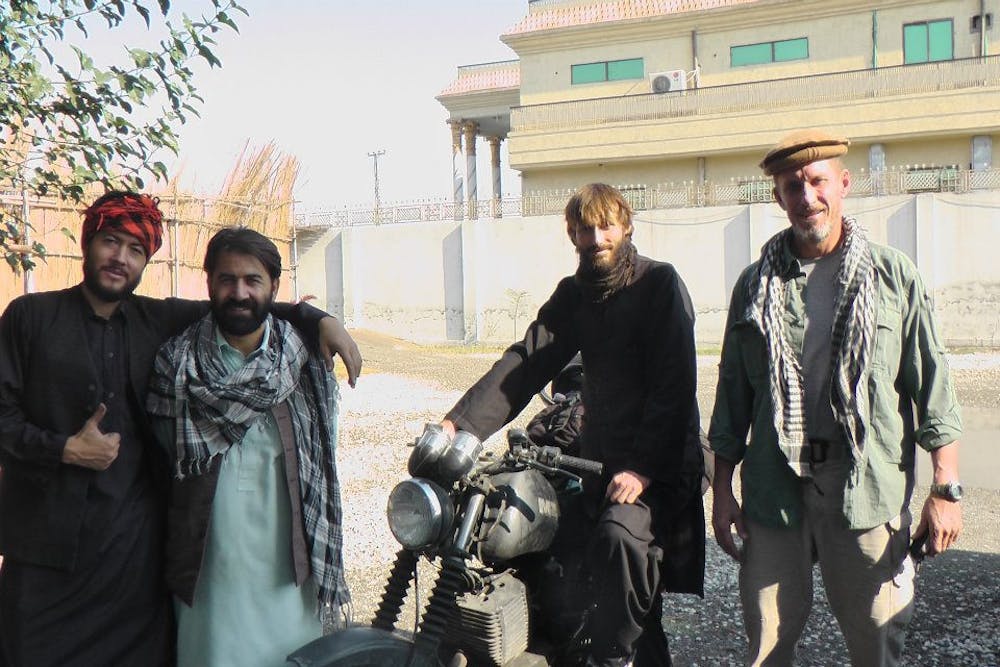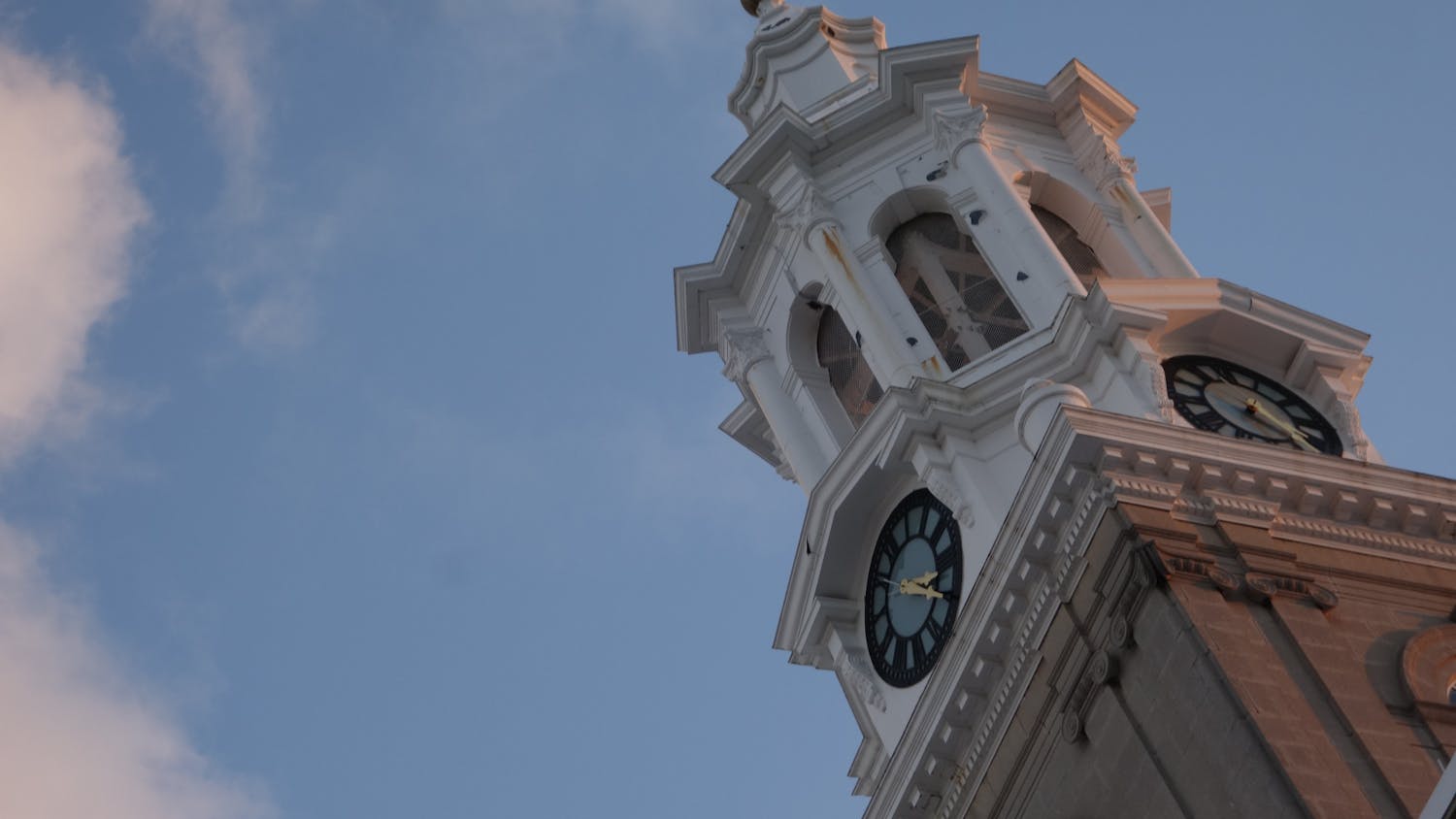Not many people get a twinkle in their eye when they retell the story of their own mock execution, but Daniel Britt does.
One of Britt’s many brushes with death began at a police checkpoint in Kurdistan. He and fellow journalist Matt Vandyke, escorted by an Iraqi soldier named Nasir, only made it to the checkpoint because of intel gathered from locals and taxi drivers — but the Iraqi police had other theories.
“We are two American citizens with valid identification who are accused of being terrorists because their logic was no one could survive a trip from Erbil to Diyala province without having known someone in Al-Qaeda,” Britt, a UB graduate and Spectrum alum, said.
What began as a police interrogation on the side of the road quickly became dire when heavily equipped special forces arrived and gave them “the whole nine yards”: bags over their heads, hands zip-tied behind their backs and possessions confiscated.
Britt was forced into the back of a pickup truck and taken to a second location. Eventually, Nasir, who had not received the same treatment, lifted his hood.
Vandyke was across from him in a separate truck.
“This dude is just getting his ass beat down and he’s demanding he’s taken to the American embassy in Baghdad. He’s very panic stricken,” Britt said of Vandyke. “He’s on his knees in the back of a pickup just getting walloped.”
Hooded once again, Nasir told Britt to prepare for a sleepless night; they were headed South to Baghdad for more questioning.
Once there, they descended to the cold underground of a government building. Nasir lifted Britt’s hood again so he could see Vandyke get kicked down a flight of stairs
“I was like, ‘Oh God, they really dislike this motherf—er,’” Britt said. “I just see his jaw; spit is hanging out of his mouth and his jaw is spasming like Pinocchio.”
Then Britt felt his captors place the “business end” of an AK-47 on his neck.
He heard them rack the slide of the rifle, a sound he knew well.
“In those three seconds, I regretted every decision I made, and I just wanted to will a message out to my family,” Britt said. “I just wanted to speak to my girlfriend one more time. I resolved myself to somehow, as a ghost, visit the people I loved in my life.”
The trigger was pulled — nothing happened.
The pair was grabbed by their necks, heads slammed into concrete and thrown into a cell with other recently mock-executed prisoners. Britt remained there until he was sprung by two consulars from the U.S. State Department.
Britt had not imagined such a situation on his 2009 flight to Baghdad during the U.S. withdrawal from Iraq, but the experience totally altered his perspective on life and how to go about this type of work. .
“I resolved to do things differently, to really figure out the cultural landscape before I make any moves,” Britt said. “I actually came out of it feeling kind of invincible to be honest.”
He learned who to trust, where to get information, and how to move as a reporter in countries where the free press is an alien concept.
Britt was in Iraq as a photojournalist. It was the first in a slew of countries that he would photograph the daily experience of those in developing nations — war, poverty, crime and religiosity — for 10 years.
His goal was to capture how war influences culture and shapes the realities of those involved.
“It’s kind of like molten cultural space,” Britt said. “You’re on the edge of history. It’s a very necessary place to photograph and write about. To mix your perspective as an objective outsider with the perspective of the zealots, the patriots, the religious fanatics.”
His chaotic and formative trip was borne out of a love of photography sparked in adolescence. His start came from developing pictures in his self-made dark room in his hometown of Holland, NY, including pictures of beautiful women that he would sneakily capture.
It’s natural for Britt to put himself into kinetic situations. Playing sports, getting sent home from church, and sailing were just some of the ways he entertained himself as a kid.
“It was very easy to light my fire and get me to like, live in Delaware Park for three days,” Britt said. “To hang out with homeless people, or ask random college girls out that I didn't know when I was a sophomore in high school.”
Britt entered UB as a pre-med student, but felt the call of journalism while writing for The Spectrum and other Buffalo papers. He didn’t want to be in a medical lab. He wanted to be out in the world.
“I actually wanted to skip college and just travel,” Britt said. “But because I graduated from a Catholic school and I have an Asian mom, I was like ‘Alright, I have to go to college. I’ll do that.’ But then as soon as I graduated I just hit the road.”
In 2003, Britt graduated from UB and told his parents that he was “studying for the MCAT.” In reality, Britt moved to California and supported himself through commercial photography.
Inspired by a group of San Francisco photographers he met while working at a camera store, Britt saved up $500 and bought a one way ticket to Iraq. He received a bulletproof vest from the local police chief upon arrival.
Through war zones in the Middle East and slums in Africa, he became immersed in cultures and experiences far more removed from America. In Nairobi, he witnessed prostitution, gun-running, and mob justice that disfigured or killed its targets. At one point he caught malaria and became delirious — hallucinating voices of past girlfriends and family members — until he was saved by medicine found in an abandoned hospital.
In the Middle East he witnessed firsthand bombings, sniper battles, indiscriminate gunfire, and even airstrikes.
“The plane gets so close, you can’t hear anything. It’s like someone slapped a vacuum right on your ear,” Britt said. “All this stuff kicks up, you’re confused, the bomb drops percussion sends you flying. And then as soon as the sky is clear you hear buildings fall; you’re just surrounded by injured and broken buildings. You can’t breathe. You can’t see.”
He documented it all, up close and personal.
The picture he’s most proud of was shot in 2009 on Aris Island in Iraq. It depicts a young girl blocking her face from the camera with a chicken.
“She doesn't want to be photographed because that would make her a whore. And she was 9-years-old,” Britt said. “She was looking for a husband, and her family was looking for a husband for her. She didn’t want her morality or virginity tainted by being photographed.”
It taught him that in times of war, people will abandon their home, their car and their money in the bank, but won’t abandon their sense of morality.
Religion was an essential aspect of life he documented in the countries he visited. It was simultaneously a unifying force in the community, and one that could lead to violence against women, anti-gay attacks and armed combat between opposing sects.
Britt considered himself lucky to be as safe and sound as he is, without symptoms of PTSD or major physical injuries.
Some of the locals he met were not so lucky. Some of his close associates from his time overseas have been killed.
“I lost a fixer in Baghdad, and I lost a very cool dude in Syria; he died shortly after I left,” Britt said. “And then an Afghan friend of mine who was also very kind was killed shortly after I left Afghanistan by the Taliban. He ran a guesthouse. Just gunned down for housing Westerners, presumably.”
Britt currently makes money by sailing multi-million-dollar boats across the ocean. In his free time, Britt repairs a decrepit church, which he hopes to turn into a community-oriented multi-use space.
But there’s a world where he returns to international reporting. He doesn’t know whether it’ll involve reporting on refugees in Rohingya, writing about the war between Russia and Ukraine, or visiting friends in Nairobi, the call to adventure still whistles past his ears.Despite the amenities afforded to him in the West, he reflects on his time without them overseas with a smile on his face. He hopes to be reunited with some of his Nairobi friends and to see Iraq and Afghanistan again.
“I do like adventure. When a little kid walks up to you like, ‘Do you wanna go on an adventure?’ I’m like, ‘Yeah, I’ll go right now,’” Britt said. “If it’s new and it pushes the boundaries of what I know already — I gotta know how the story pans out, you know?”
Dominick Matarese is the senior features editor and can be reached at dominick.matarese@ubspectrum.com

Dominick Matarese is the Senior Features Editor at the Spectrum. He enjoys writing about interesting people, places, and things. In addition to running an independent blog, he has worked worked with the Owego Pennysaver, BROOME Magazine, the Fulcrum Newspaper, and Festisia. He is passionate about music journalism and can be found enjoying live music most weekends.





